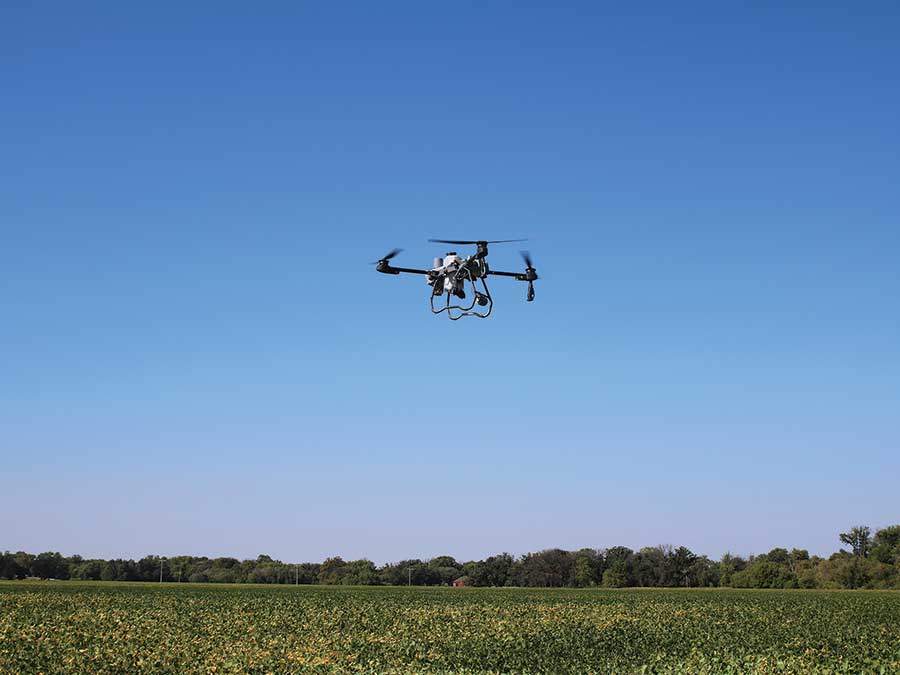A low hum rose above a soybean field east of Carman last week as a 100-kilogram agricultural drone lifted into the air, drawing the attention of farmers and industry reps gathered to see the machine in action.
On Aug. 28, Eric Melvin, a licensed advanced pilot with Vantage Drones Canada, demonstrated the DJI Agras T100 — the company’s fully loaded flagship model — during a public event designed to showcase how drones can support agriculture and other industries.
“These drones are another tool for the toolbox,” Melvin told the crowd. “They aren’t meant to replace aerial spraying, but they can be used for wet holes, fence lines, headlands and drownouts where traditional equipment struggles.”
The Agras T100 is equipped with dual sprinklers, a spreading system and advanced radar sensors that allow it to fly at low altitudes of 10 to 20 feet with centimetre-level accuracy. Its maximum payload is 100 kilograms, giving it the capacity to spray or spread across 70 to 80 acres an hour while avoiding soil compaction.
For many producers in attendance, the demonstration highlighted both the promise and the practicality of drone spraying. Melvin noted that crop compaction alone can reduce yields by up to two per cent — losses that can add up to tens of thousands of dollars.
“These drones have very advanced safety features,” Melvin said. “At five per cent battery life it lands automatically, and it will stop if it detects a pole, tree, person or even a wire. But you still need to be aware of your surroundings — don’t rely on the safety system to do the flying for you.”
Agricultural drones are considered aircraft under Transport Canada rules. Operators must hold an advanced pilot certificate, register their drones, and apply for a Special Flight Operations Certificate to conduct spraying. Training can involve in-person coursework or self-study, with exams starting at $10.
Adding to the challenge is the limited range of products that can legally be sprayed. Health Canada currently allows only five chemicals to be applied by drone, a bottleneck Melvin expects will ease in the coming years as regulators approve more labels.
“Drones have only been in Canada for five years,” he said. “We expect more approvals to come as the industry grows.”
The T100 retails at about $48,500 in its core package, with upgrades such as GPS positioning, mapping systems and extra batteries. Battery life can be as short as 10 minutes when flying with a full tank, making multiple batteries essential for larger jobs.
Melvin emphasized that Vantage Drones also provides Canadian-based service and repairs, meaning producers won’t face delays from overseas shipping. Most damage, he added, comes from human error such as crashes, with replacement arms or landing gear among the most common fixes.
Melvin acknowledged that holding a demo in the middle of harvest season wasn’t ideal but said curiosity about the technology drove the event forward.
“People are curious, and we want to show them what this technology can do,” he said.
While drones are unlikely to fully replace aerial applicators, Melvin said the technology offers farmers more flexibility, efficiency and safety. For those looking to cut input costs or reach areas of a field conventional equipment can’t, drones may soon become part of everyday operations.
For more information or consultations, Melvin can be reached at eric@vantagedrones.ca.
